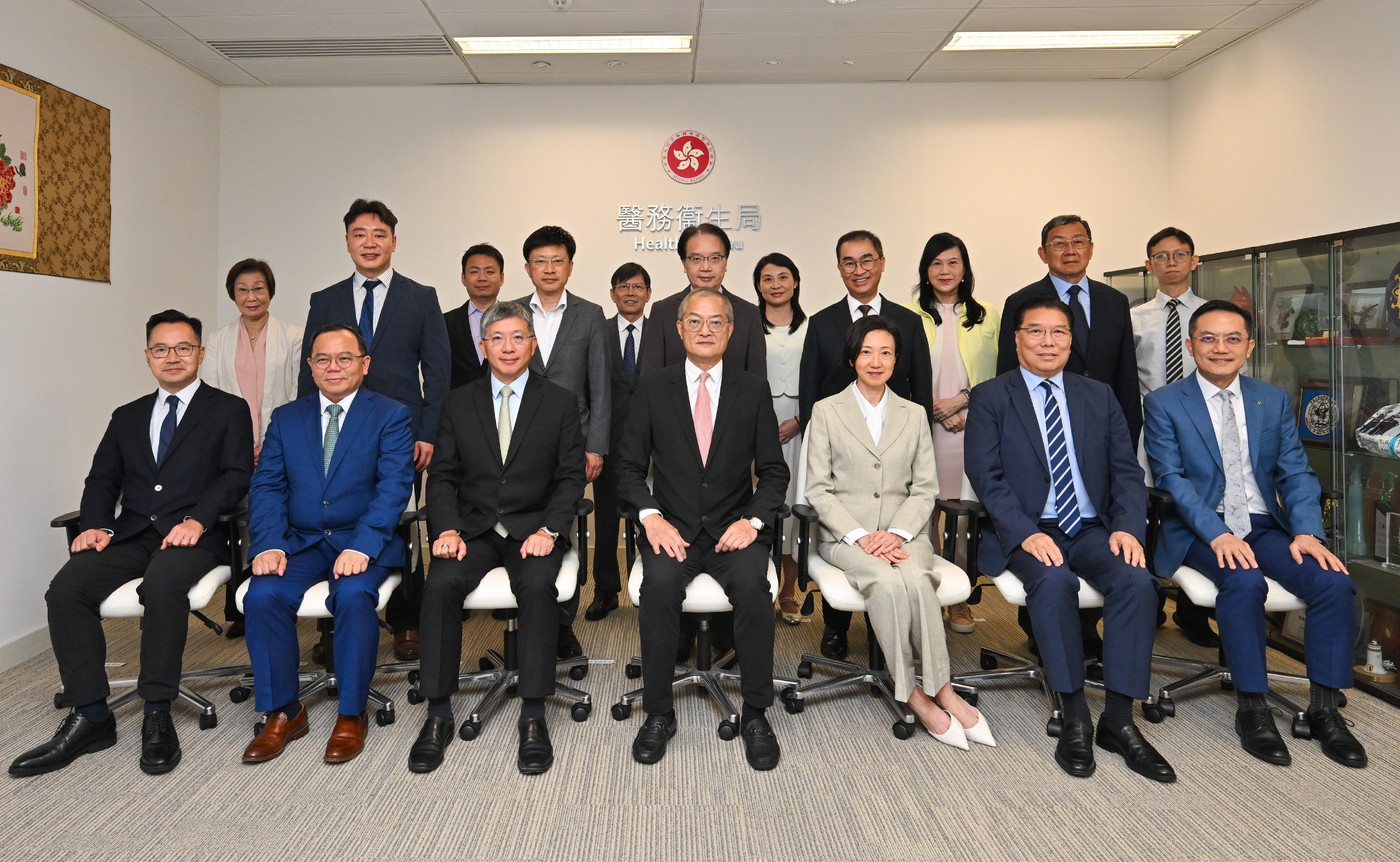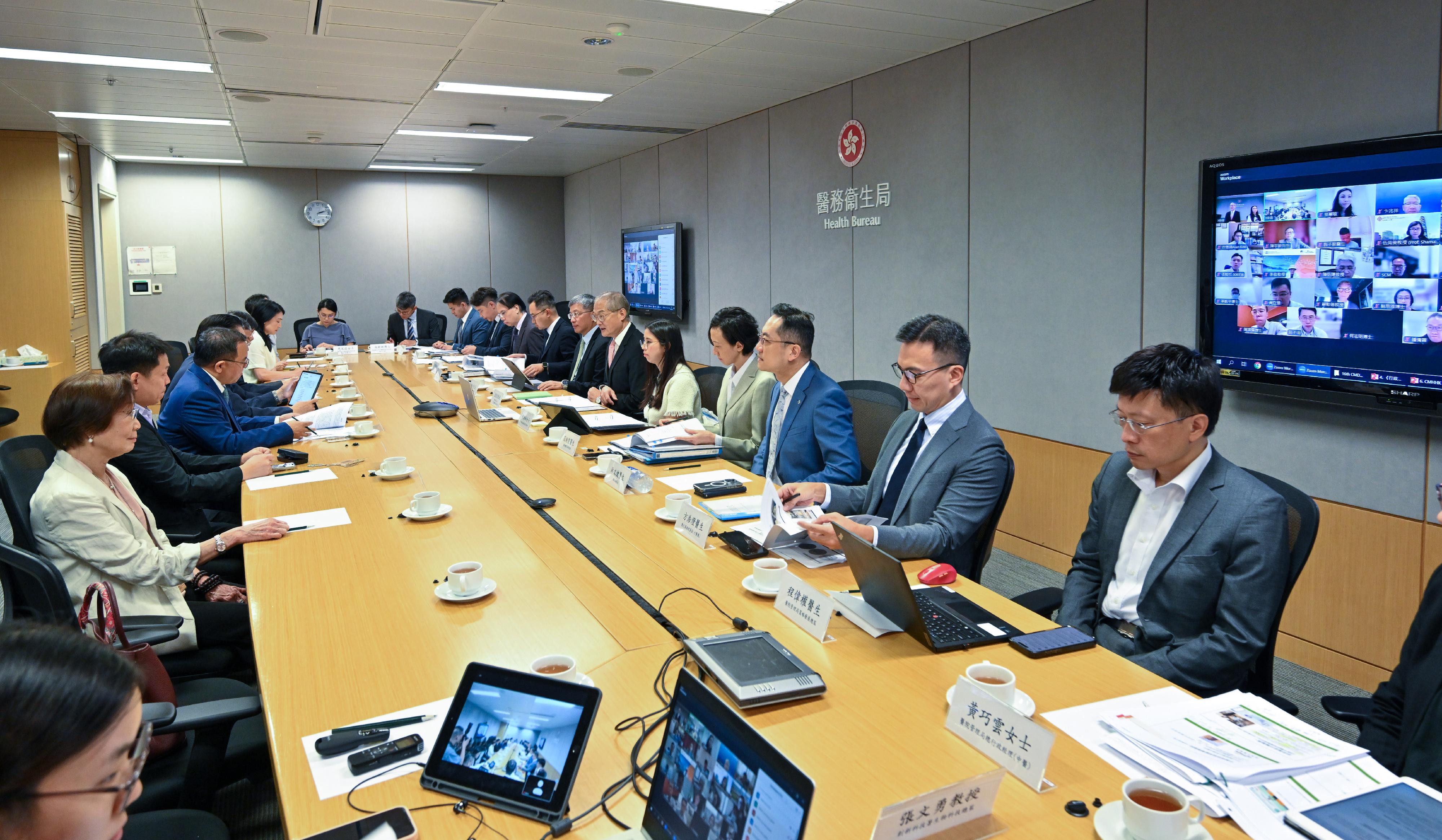Secretary for Health chairs joint meeting of Chinese Medicine Development Committee and its three subcommittees (with photos)
******************************************************************************************
Professor Lo said, "The year 2025 is a notable year for CM development in Hong Kong, signifying more breakthroughs, reforms and opportunities for CM development in Hong Kong. We will publish Hong Kong's first Blueprint by the end of this year. Meanwhile, the two flagship institutions for CM development, namely CMHHK and the permanent premises of the GCMTI, will also commence services in phases starting from December this year."
On the formulation of the Blueprint, the CMDBSC and its three working groups have each held multiple meetings to focus on discussing various topics on CM development since their establishment in September last year. The Chinese Medicine Unit of the Health Bureau has conducted hundreds of exchange activities with stakeholders in the CM sector from local, the Mainland and overseas. After consolidating views from various parties, the CMDBSC has made recommendations to the CMDC on the concrete strategies for the overall development of CM, as well as the short-, medium- and long-term objectives and respective feasible initiatives for the long-term planning outlined in the Blueprint.
Professor Lo said, "I would like to express my gratitude to members for their invaluable advice on policy initiatives relating to CM development. I look forward to the Blueprint, jointly formulated with members and stakeholders of the CM sector, mapping out the vision and strategies for the future development of CM in Hong Kong, thereby developing Hong Kong into a bridgehead for CM to go global."
In addition, preparations for the commissioning of CMHHK and the permanent premises of the GCMTI are now in full swing. The two flagship institutions for CM development, with services to be commenced in phases from December this year, will be conducive to Hong Kong's further development in areas such as CM clinical services, talent training, and testing standards. In the first year, CMHHK will provide out-patient and day-patient services, as well as roll out CM services for special diseases, including degenerative diseases, stroke rehabilitation and other common diseases among the elderly, to provide the public with more comprehensive options for healthcare services.
During the meeting, representatives of relevant government departments and organisations also briefed the members on the latest progress of other major CM policy initiatives outlined in "The Chief Executive's 2025 Policy Address", including:
- Promoting the sharing of electronic health records (eHRs) in the CM sector through eHealth, and further expanding the sharable scope of eHRs on eHealth between CM and Western medicine practitioners;
- Advancing the development of the Integrated Chinese-Western Medicine services by expanding the Hospital Authority (HA)'s "knee osteoarthritis" programme to all hospital clusters, and commencing the "palliative care" pilot programme to provide palliative care services for patients suffering from conditions such as organ failure, thereby improving their quality of life; and
- Hosting the Guangdong-Hong Kong-Macao Greater Bay Area (GBA) Conference on Inheritance, Innovation and Development of Traditional Chinese Medicine in December this year to gather experts and stakeholders from the GBA, the Mainland and overseas to explore the high-quality development and future direction of CM.
Professor Lo said, "I led a delegation to call on the National Health Commission, the National Administration of Traditional Chinese Medicine and the National Medical Products Administration in Beijing this September to introduce the latest updates of various key healthcare initiatives, including the latest CM developments in Hong Kong, the formulation of the Blueprint and developing Hong Kong into an international health and medical innovation hub. The Chief Executive put forward a number of policy initiatives on CM development in his 2025 Policy Address. The Government will continue to press ahead with the high-quality and high-standard development of CM in Hong Kong on all fronts, leveraging the unique advantage of enjoying strong support from the motherland and being closely connected to the world, with a view to assisting the national drive for CM to go global and contributing to the national development of CM."
The Permanent Secretary for Health, Mr Thomas Chan; the Under Secretary for Health, Dr Cecilia Fan; the Director of Health, Dr Ronald Lam; Deputy Secretary for Health Mr Eddie Lee; the Project Director of the Chinese Medicine Hospital Project Office of the Health Bureau, Dr Cheung Wai-lun; the Director (Strategy and Planning) of the HA, Dr Ching Wai-kuen; the Hospital Chief Executive of CMHHK, Professor Bian Zhaoxiang, and representatives of the relevant government departments and organisations also attended the meeting today.
Established in 2013 and chaired by the Secretary for Health, the CMDC drives the direction and long-term strategies of the future development of CM in Hong Kong by providing recommendations to the Government in four key areas, namely the development of CM services, personnel training and professional development, scientific research and development, and development of the CM drug industry (including CM drug testing).
Ends/Thursday, October 9, 2025
Issued at HKT 15:47
Issued at HKT 15:47
NNNN






